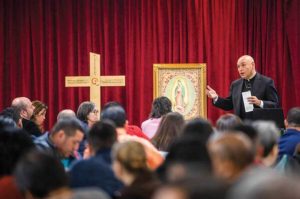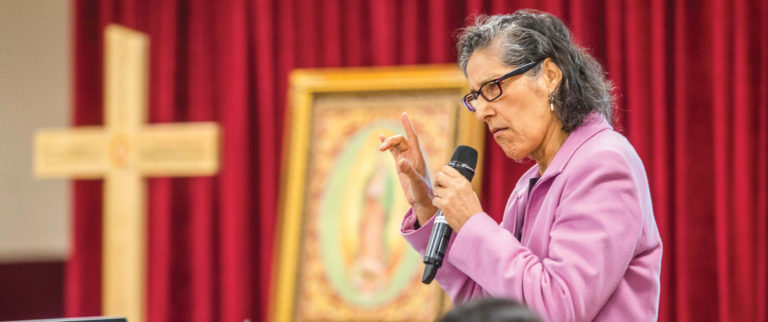
More than 100 Hispanic Catholic leaders – responsible for implementing the conclusions from the V Encuentro of Hispanic/Latino Ministry – accepted the challenge of working on the training of new missionary disciples who will be making up the Hispanic leadership over the next three decades.
Gathering Feb. 15 at St. Mary’s Parish in Landover Hills, the participants reviewed the training and certification options for the future agents of evangelization from Region 4, which includes the Archdiocese of Washington, Archdiocese for U.S. Military Services, and Archdiocese of Baltimore, and the dioceses of Arlington, Richmond, Wheeling-Charleston, and Wilmington.
Washington Auxiliary Bishop Mario Dorsonville said the time has come for a new contingent of young men and women to take on leadership roles and be the voice for migrants, who have no voice; to deepen their formation of sacramental life; and to increase their awareness of the needs of Hispanic families in the United States.
“As Hispanics, we play an important role in the future of the Catholic Church in the United States. We must work tirelessly on the formation of parish leaders for the next 30 years. This is a commitment stemming from the parishes themselves and one that must grow in a sustained manner in the dioceses and archdioceses of our region,” Bishop Dorsonville said.
He also pointed out that formative work needs to cover areas such as accompaniment of migrant families and carrying out catechetical programs in which parents can actively participate because we are all called to be missionary disciples.
Elena Segura, member of the National Immigration Ministry [Pastoral Migratoria], explained that the pastoral ministry is based on the methodology described in the Final Document of Aparecida, a conclusions report from the Fifth General Conference of the Bishops of Latin America and the Caribbean that took place in the Shrine of Aparecida (Brazil) in 2007.
“Since 2007, the Church in the United States has worked to invite the faithful to respond to their baptismal call and get involved in service and justice promotion within their parish communities, especially where the presence of migrants is evident. As Hispanics, we are called to show solidarity with migrants and work on solutions to the problems millions of our brothers and sisters face because of migration,” she said.
Segura added that the migration issue was thoroughly examined by both clergy and laity at the V Encuentro of Hispanic Pastoral Ministry. The conclusions were to vigorously promote not only the training of new leaders but also the development of new community service programs, to accompany families by detention or deportation, and to participate in campaigns that benefit the migrant community.
“We are all called to proclaim the Gospel, but also to listen to the outcry for justice coming from our communities, to inform ourselves of the current reality, and to act in concrete ways that show God’s love,” noted Elena Segura, who has been promoting the Instituto de Pastoral Migratoria.
Segura announced that on March 5 an online seminar called “Introduction to Immigration Ministry [Introducción a la Pastoral Migratoria]” will be held from 1:30 to 3:00 p.m. to provide training and information to pastoral teams interested in developing immigration leadership through service activities, justice promotion, and accompaniment initiatives in parish communities. To register, interested individuals may contact Yohan Garcia at (312) 534-8371 or Ygarcia@archchicago.org.
Father Evelio Menjivar, pastor of St. Mary’s of the Mills Parish, described the meeting on immigration ministry and the need to train new Hispanic leaders in our region as timely and important.
“The Church is all of us and the migration issue directly affects our communities. Building a cadre of new leadership based on service, justice, and accompaniment is one of the recommendations rising from the V Encuentro of Hispanic/Latino Ministry,” he added.
Fatima Martinez, a theology student at The Catholic University of America, believes that the training of new parish leaders is of utmost importance in times as challenging as these, because today many young people prefer to avoid talking about God and instead focus on themselves. “The migration phenomenon currently being experienced in the United States forces us to strengthen our awareness so that we can respond appropriately within the framework of the Church’s social doctrine.”
Alfredo Serrano, a member of the Hispanic Committee of the Diocese of Richmond, said that the V Encuentro has sparked a great excitement among many young Hispanic Catholics, who are now beginning to look at the Church not so much in terms of devotion or doctrine, but as a place of action. “This is wonderful, and we need to support the emergence of a new national and regional leadership,” he said.


